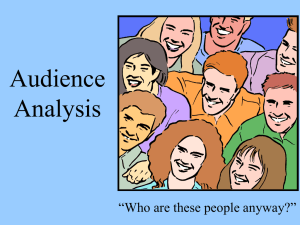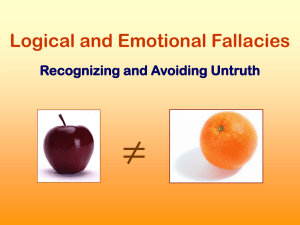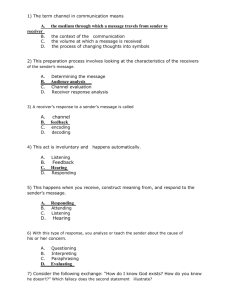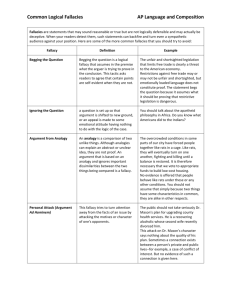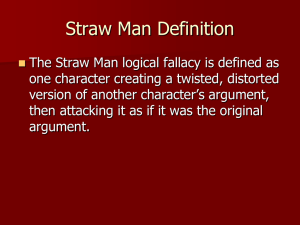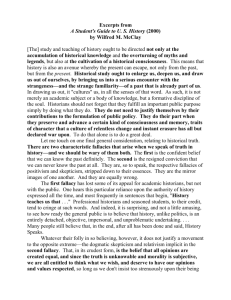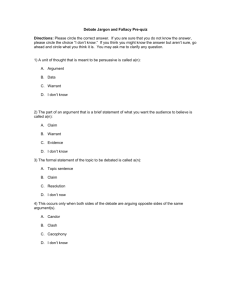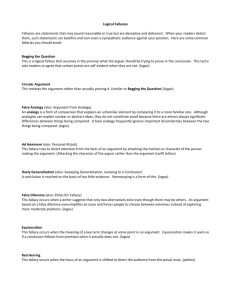Logical Fallacies
advertisement
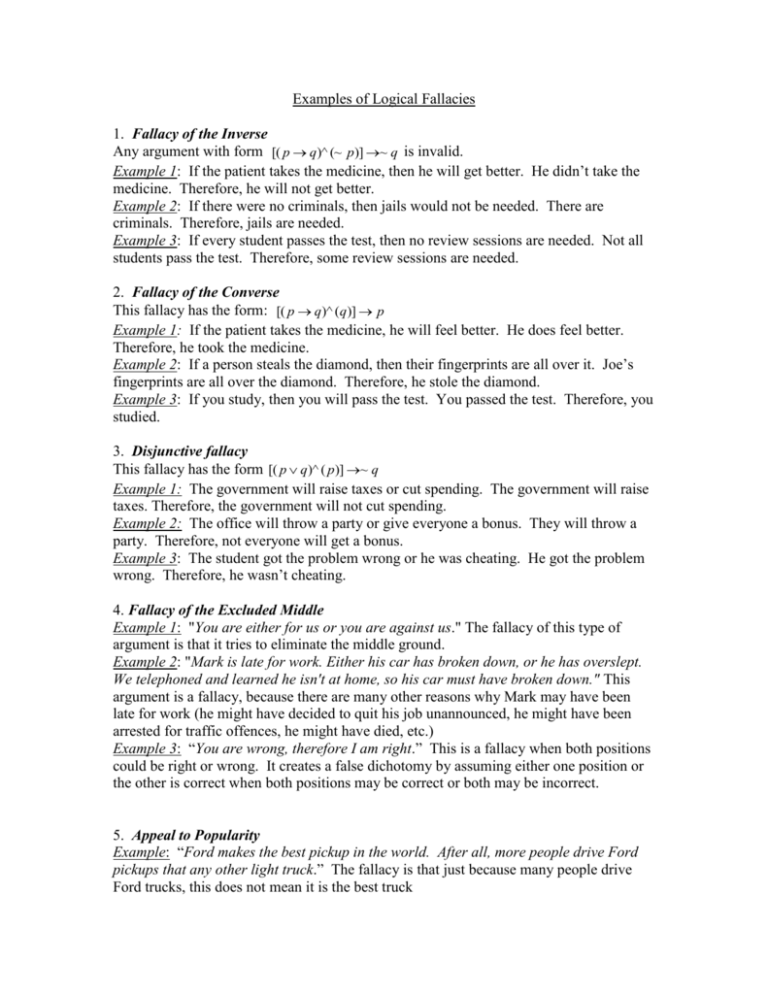
Examples of Logical Fallacies 1. Fallacy of the Inverse Any argument with form [( p q)^ (~ p)] ~ q is invalid. Example 1: If the patient takes the medicine, then he will get better. He didn’t take the medicine. Therefore, he will not get better. Example 2: If there were no criminals, then jails would not be needed. There are criminals. Therefore, jails are needed. Example 3: If every student passes the test, then no review sessions are needed. Not all students pass the test. Therefore, some review sessions are needed. 2. Fallacy of the Converse This fallacy has the form: [( p q)^ (q)] p Example 1: If the patient takes the medicine, he will feel better. He does feel better. Therefore, he took the medicine. Example 2: If a person steals the diamond, then their fingerprints are all over it. Joe’s fingerprints are all over the diamond. Therefore, he stole the diamond. Example 3: If you study, then you will pass the test. You passed the test. Therefore, you studied. 3. Disjunctive fallacy This fallacy has the form [( p q)^ ( p)] ~ q Example 1: The government will raise taxes or cut spending. The government will raise taxes. Therefore, the government will not cut spending. Example 2: The office will throw a party or give everyone a bonus. They will throw a party. Therefore, not everyone will get a bonus. Example 3: The student got the problem wrong or he was cheating. He got the problem wrong. Therefore, he wasn’t cheating. 4. Fallacy of the Excluded Middle Example 1: "You are either for us or you are against us." The fallacy of this type of argument is that it tries to eliminate the middle ground. Example 2: "Mark is late for work. Either his car has broken down, or he has overslept. We telephoned and learned he isn't at home, so his car must have broken down." This argument is a fallacy, because there are many other reasons why Mark may have been late for work (he might have decided to quit his job unannounced, he might have been arrested for traffic offences, he might have died, etc.) Example 3: “You are wrong, therefore I am right.” This is a fallacy when both positions could be right or wrong. It creates a false dichotomy by assuming either one position or the other is correct when both positions may be correct or both may be incorrect. 5. Appeal to Popularity Example: “Ford makes the best pickup in the world. After all, more people drive Ford pickups that any other light truck.” The fallacy is that just because many people drive Ford trucks, this does not mean it is the best truck 6. False Cause Example: “I placed crystals on my forehead and in five minutes my headache was completely gone. Therefore, the crystals made my headache go away.” This argument is fallacious because there is no proof that the crystal caused the headache to go away. The headache could have gone away for another reason. 7. Appeal to Ignorance Example 1: “You can’t prove your views, therefore they must be wrong.” This fallacy occurs when someone says something is true because there is no proof it is wrong or says something is wrong because there is no proof it is true. Example 2: “There is no scientific explanation of why his headache went away, therefore it was truly a miracle.” Just because we don’t know the scientific reasons why the headache went away does not mean that there is no possible scientific explanation. 8. Hasty Generalization Example: “There have been two children that have gotten leukemia along the street where the high-voltage power lines run. The power lines are the cause of the leukemia.” This is a fallacy because the two cases are not enough evidence and also don’t prove that the power-lines are actually the cause of the disease. 9. Appeal to Emotion Example 1: “If the defendant is acquitted, there will be riots. Therefore, he is guilty.” The argument is fallacious because fear of riots is not a logical reason to convict someone. Example 2: The TV commercial showing a baby sitting in a tire with the line “Because so much is riding on your tires.” The ad makes the argument that if you love your baby enough, you will buy a certain brand of tires. It is a fallacy because other brands may be just as good or better. 10. Personal Attack Example 1: "You claim that this man is innocent, but you cannot be trusted since you are a criminal as well." This fallacy uses a personal attack to support a claim instead of addressing the real issue. Example 2: “Candidate Jones' proposal is ridiculous. She was caught cheating on her taxes in 2003." This argument uses a personal attack as a sufficient reason for the claim that the proposal is ridiculous instead of debating the actual issue. 11. Circular reasoning (also called “begging the question”) These arguments are essentially including the conclusion as a premise. Example 1: “All intentional acts of killing human beings are morally wrong. The death penalty is an intentional act of killing a human being. Therefore, the death penalty is morally wrong.” Example 2: “Society has an obligation to shelter the homeless because the homeless have a right to the resources of the community.” This reasoning is circular because both the initial statement and the reason given are essentially saying the same thing. Example 3: “If these people are guilty and have shown no remorse for their crime, this can only mean that they are bad people, and this strengthens our conviction that they are guilty.” This is a fallacy because the argument essentially says that if they are guilty, then they are really guilty. Example 4: The rapper Mims says “I am hot because I am fly.” Basically, translating the slang, he is saying “I am good because I am good.” * Note: Many people use the expression “begging the question” when they mean the argument raises an obvious question. The expression “begging the question” is a translation from Latin for a circular argument. 12. Straw Man Fallacy Example: “The mayor has proposed decriminalizing drug possession to reduce overcrowding in jails. Therefore, the mayor doesn’t think there is anything wrong with drug use.” The fallacy in this argument is that it’s likely distorting the mayor’s position. The mayor may actually think that drug use is very harmful. However, the mayor might still consider it worthwhile to decriminalize drugs to reduce what might be an even worse problem in the overcrowded jails. In other words, the person making the argument makes a false claim about mayor’s position which is easy to defeat. The term “straw man” comes from the idea that a straw man would be an easy target to defeat. 13. Red Herring Example 1: “Baseball player Mark McGwire just retired. He's such a nice guy, and he gives a lot of money to all sorts of charities. Clearly, he will end up in the Hall of Fame.” A red herring is a statement that attempts to divert attention elsewhere instead of addressing the real issue. The fact that he was a nice guy is not a sufficient reason to be in the Hall of Fame. Example 2: “I should not pay a fine for reckless driving. There are more dangerous criminals on the street, and the police should be chasing them instead of harassing a decent person like me.” The red herring is the claim that there are more dangerous criminals on the street. This does not change the fact that the person making the argument may still have broken a law. A herring is a fish that turns red when rotten. The use of the term “red herring” can be traced back to the 19th century when British fugitives found that could divert bloodhounds from their pursuit by rubbing a red herring across their trail. More reading: 1. http://www.onegoodmove.org/fallacy/toc.htm 2. http://www.logicalfallacies.info/ 3. http://www.fallacyfiles.org/ 4. http://en.wikipedia.org/wiki/Fallacy
